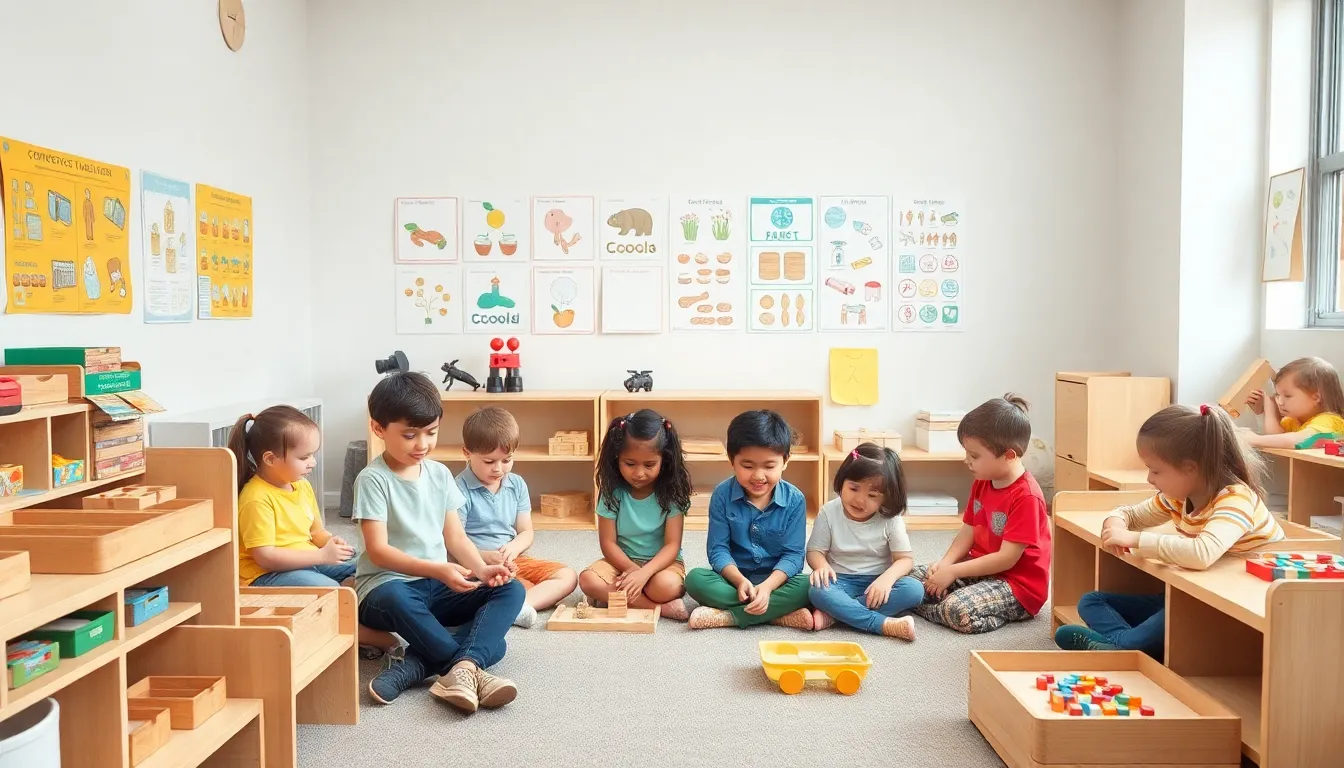Imagine a classroom where children learn at their own pace, exploring the world like tiny adventurers. Welcome to the Montessori teaching philosophy, where education is less about rote memorization and more about curiosity-driven discovery. This approach transforms traditional learning into an engaging journey, allowing kids to embrace their natural instincts and interests.
Table of Contents
ToggleOverview of Montessori Teaching Philosophy
Montessori teaching philosophy centers on self-directed learning, where children delve into subjects that capture their interest. This approach nurtures curiosity and independence, fostering a love for learning. By offering various hands-on materials, educators stimulate exploration and critical thinking skills.
Classroom environments reflect freedom and responsibility. Children choose activities from accessible learning materials, promoting decision-making and problem-solving. They engage in mixed-age groups, facilitating peer learning and social development.
Instruction emphasizes observation over direct intervention. Teachers guide rather than dictate, allowing children to pursue their interests while maintaining a structured setting. This method cultivates intrinsic motivation, setting the stage for lifelong learning.
Montessori materials serve specific developmental purposes. These resources cater to different learning styles and abilities, ensuring all children can thrive. Additionally, the prepared environment plays a vital role, as it encourages meaningful interactions with materials and peers.
Social and emotional growth forms another critical aspect. Classrooms emphasize respect, empathy, and cooperation, helping children develop strong interpersonal skills. Relationships formed in a Montessori setting often encourage a sense of community and belonging.
The philosophy also recognizes sensitive periods in child development. These periods indicate times when children are most receptive to learning specific skills. Addressing these phases optimizes the learning process and enhances skill acquisition.
Montessori emphasizes holistic education. The method nurtures not only academic skills but also social, emotional, and physical development. Such a comprehensive approach prepares children for real-world challenges and opportunities effectively.
Key Principles of Montessori Education

Montessori education is built on several key principles that enhance the learning experience for children. These principles prioritize individualized growth and development.
Child-Centered Learning
Child-centered learning remains a foundation of Montessori education. It allows children to pursue their interests at their own pace. Educators design environments rich in hands-on materials, promoting exploration and independent thought. Children freely choose activities that intrigue them, fostering deeper engagement and understanding. Within mixed-age classrooms, collaboration among peers cultivates social skills and shared learning experiences. This approach contrasts sharply with traditional, one-size-fits-all methods, which often stifle a child’s natural curiosity.
Importance of Independence
Independence plays a critical role in Montessori philosophy. Children gain confidence as they make choices and solve problems autonomously. Instructors guide rather than direct, fostering a sense of responsibility for learning. This self-directed approach not only encourages critical thinking but also nurtures intrinsic motivation. Children who experience freedom in their learning often develop perseverance and resilience, essential traits for overcoming future challenges. Respect for each child’s developmental stage empowers them to take ownership of their educational journey.
Role of the Teacher in Montessori
The teacher in a Montessori classroom serves a pivotal role as a guide in the learning process rather than an authoritarian figure.
Facilitator vs. Authority Figure
Teachers facilitate learning by observing children and tailoring their support to individual needs. Rather than delivering lectures, they encourage self-discovery, allowing children to take charge of their education. This connection nurtures independent learners who thrive on curiosity. Although teachers step back from traditional authority roles, they intervene when necessary, ensuring that children remain engaged and challenged. Teachers cultivate trust within the classroom, promoting a safe space for exploration. With a focus on intrinsic motivation, children engage deeply with materials, developing critical thinking skills and confidence in their abilities.
Creating a Prepared Environment
The prepared environment within Montessori classrooms is carefully organized to foster exploration and discovery. Each space invites children to engage with hands-on materials tailored to their developmental stages. Specific areas are designated for different activities, promoting focus and independence. Teachers regularly assess and adjust materials to align with each child’s interests and learning needs. Classroom organization emphasizes accessibility, enabling children to choose and return materials independently. The community atmosphere encourages collaboration among peers, enhancing social skills and cooperative learning. Ultimately, the environment itself becomes a teacher, guiding children toward meaningful interactions and personal growth.
Benefits of Montessori Teaching Philosophy
Montessori teaching philosophy offers numerous advantages that enhance children’s learning experiences. This approach nurtures a holistic development that includes academic, social, and emotional growth.
Fostering Curiosity and Creativity
Curiosity thrives in a Montessori environment. Children choose their own activities, allowing them to explore subjects that ignite their interests. Hands-on materials stimulate creativity and critical thinking. Engaging with these resources encourages problem-solving and innovation. Teachers observe and guide rather than direct, fostering a mindset where exploration is valued. Creativity flourishes as children are encouraged to ask questions and seek answers on their own terms. This model instills a love for learning, motivating children to delve deeper into their passions.
Promoting Social Skills and Collaboration
Social skills enhance significantly in Montessori classrooms. Mixed-age groups allow children to learn from one another, fostering collaboration and peer interaction. Respect and empathy are integral components of the learning environment. Children engage in group activities, developing their ability to communicate and work together. Cooperation becomes second nature as they navigate projects and share responsibilities. Teachers facilitate this process by cultivating an atmosphere of inclusion and support. Developing strong interpersonal skills prepares children for future relationships and teamwork in various settings.
Criticisms and Challenges
Critics often highlight various criticisms and challenges associated with the Montessori teaching philosophy.
Misinterpretations of the Philosophy
Misinterpretations of Montessori principles can lead to confusion. Some educators mistakenly equate freedom with a lack of structure. Structured guidance remains essential in supporting children’s development. Additionally, the belief that Montessori classrooms lack discipline overlooks the emphasis on self-regulation and respect. Critics often voice concerns about the approach being too child-driven, questioning the balance between autonomy and necessary instruction. The debate continues as to whether this model suits every learner. Understanding these nuances becomes vital in addressing misconceptions and promoting informed implementation.
Scalability in Traditional Education Systems
Scalability poses challenges when integrating Montessori principles into traditional education systems. Many schools struggle to adopt a fully child-centered approach within a standardized curriculum. These environments often prioritize standardized testing, limiting the freedom special to Montessori classrooms. Administrators might resist changes that promote flexible learning styles. Teachers may not receive adequate training to implement Montessori methods effectively. Despite these hurdles, some institutions find ways to blend traditional and Montessori practices, fostering a hybrid approach. Ongoing evaluations of these models will determine the best possible outcomes for students.
The Montessori teaching philosophy offers a transformative approach to education that prioritizes children’s natural curiosity and independence. By creating environments that foster exploration and collaboration, it cultivates a love for learning that extends beyond the classroom. Children develop essential social and emotional skills while engaging in self-directed activities that promote critical thinking and problem-solving.
While challenges exist in implementing this philosophy within traditional education systems, the benefits of a Montessori approach are evident. It empowers children to take ownership of their learning journeys, preparing them for future challenges and opportunities. Embracing the principles of Montessori can lead to a more holistic and enriching educational experience for all learners.




